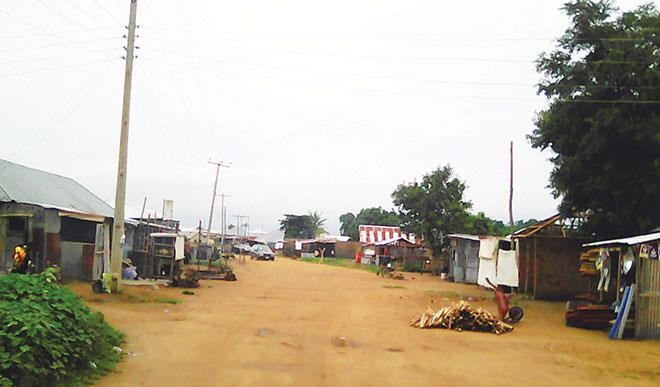Abuja community gets 30 days quit notice
To make Abuja buildings conform to the city’s original master plan, the FCTA, through the department of Development Control, had often embarked on demolition of buildings and structures in the territory. Besides demolitions, buildings that violate building standards or erected where they were not supposed to be are sealed. While in some cases, buildings are […]


To make Abuja buildings conform to the city’s original master plan, the FCTA, through the department of Development Control, had often embarked on demolition of buildings and structures in the territory.
Besides demolitions, buildings that violate building standards or erected where they were not supposed to be are sealed.
While in some cases, buildings are demolished for failing integrity test or sealed for integrity test to be conducted on them as a precautionary action to avert collapse.
Notwithstanding the reasons government used to give to justify demolition of structures, some people have divergent views on demolition of buildings that residents spent their hard earned savings to build. These people argue that, the FCTA ought to have, through proper monitoring and regulations, prevented such buildings from springing up in the first place, rather than wait until people completed them and settled in them and destroy them.
One of the areas awaiting the bulldozers of the Development Control Department of the FCTA is Sabo Iddo village, along Airport Road.
The FCT, Wednesday, issued residents of the area one month notice to voluntarily leave the community or face the FCT Development Control Department’s bulldozers.
To show its level of seriousness over the impending demolition of the community, the Development Control officials, accompanied by a combined team of armed policemen and soldiers, stormed the community to inform the residents and the community’s head, Alkali Ibrahim, of the decision to demolish buildings standing on a large expanse of land in the community.
The Deputy Director, Monitoring and Enforcement, Kuchume S. Bawa, who led the team, told the community that the settlement was illegal and encroached permanent site of the University of Abuja.
Bawa said that the settlement would be totally demolished as it is located within the area allocated for the university.
He said that at the expiration of the one month notice, officials of the department would return to the community to carry out intensive marking of houses in the village.
He said that though the government adopted dialogue method in its effort to stop building of illegal structures and expansion of the settlement, issuance of removal notice and or actual removal of illegal buildings are part of the routine function of the department, under the Abuja Metropolitan Management Council (AMMC).
He stressed that the department instead of storming the community with its bulldozers to enforce removal of the illegal structures on the university’s land, the officials chose to visit the area to inform the people concerned to voluntarily leave the place to avoid recording loss of any kind.
“Before, we just moved in and start carrying out removal of illegal structures, but now that is not what we do,” he said. “We first dialogue with the people concerned, so that we will now know what their problems are and the best strategies to be used to remove the illegal structures.”
As soon as the development control gave the community one month notice to vacate the area, fear and despair engulfed the residents. The village is said to be occupied by about 30,000 indigenous Gbagyi natives of Abuja and other settlers.
Daily Trust gathered that majority of the Sabo Iddo settlers are famers, artisans and businessmen.
The residents expressed their shock and disbelief over the development.
Chief of Sabo Iddo community, Yakubu Musa Alkali, said that the claim made by the authorities that the settlement is illegal is untrue as the place has been in existence for a very long time.
He said that the area is their ancestral land and he was born in the community and had seen the development of FCT to what it is today without anybody threatening to displace them.
He said that they were not informed of any demolition notice until Wednesday, adding that normal procedures were not followed by the department’s officials.
“The chief of Garki ought to be communicated to and then the district head of Iddo who will then briefed me of the government’s intentions, but that wasn’t done,” he said.
Alkali said that in his position as the ward head, he has no intention of taking up the matter with the FCTA, as the district head who he is directly under, would take the next line of action.
The head said that it wasn’t only Sabo Iddo that is said to encroach the land allocated to the University of Abuja, wondering why the community was the only one singled out for demolition. Beside, he said, the population there is too large to be given a month’s quit notice.
Alkali, however, appealed to the government to reconsider its decision to demolish their houses, saying that his people have no other place to go if they are forced out of the community.
When Daily Trust asked some of the residents on whether they would comply with the authority’s directive, they said that their fate rest squarely in the hands of the ward head, whom they hope would seek justice for them.
A resident, Roseline Musa, who looked worried, said that she has been living in the community for many years now and would find it difficult to cope if they were forced out.
“I live here with my two children,” she said. “I also engage in petty business here. They should please leave us alone because we are managing ourselves here and have always remained law abiding.”
Daily Trust observed many houses undergoing construction and farms competing for space in the community.
